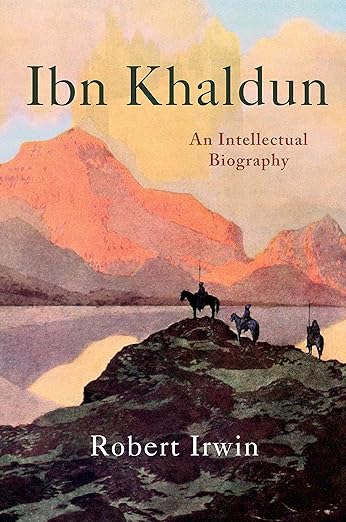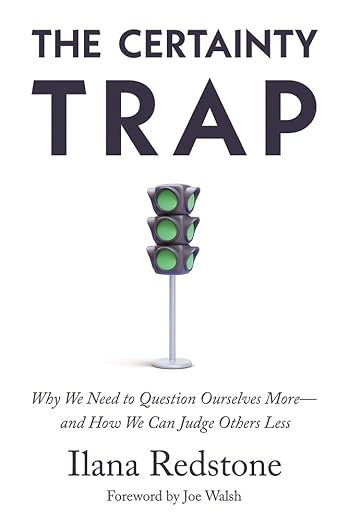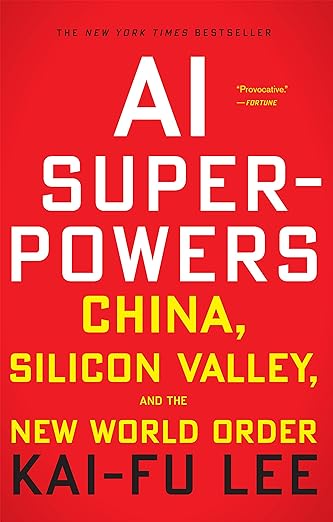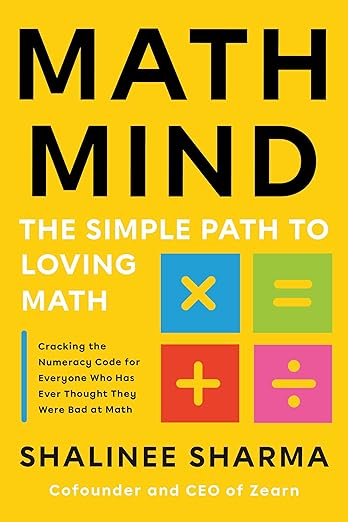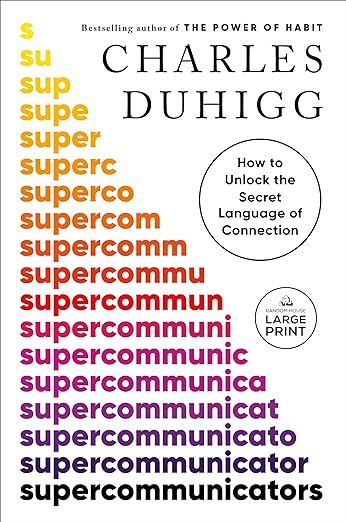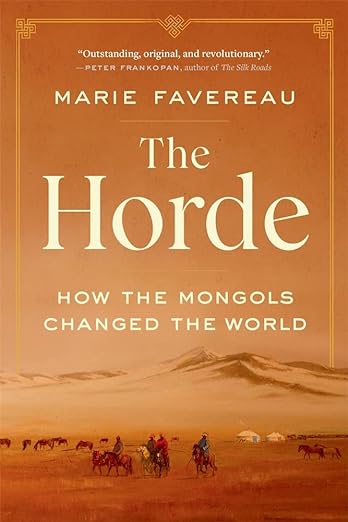
Cheery Friday Greetings from Barb Oakley!
Book of the Month
The Horde: How the Mongols Changed the World by Marie Favereau. Favereau’s fascinating work upended what I thought I knew about empires. We’re used to reading about empires like Rome – fixed, geographic entities with clear borders and static capitals. But the Mongols created something radically different: a mobile empire that operated more like a vast network than a territory with fixed boundaries.
What stood out was their pragmatic approach to rule. The Mongols mastered the art of indirect governance, allowing religious and cultural autonomy across their territories. This flexibility proved far more effective than rigid centralization would have been—and perhaps it had to be, given their nomadic roots.
Their economic achievements were equally impressive. The Mongols developed sophisticated trade networks and financial systems that created unprecedented prosperity across Eurasia. While Favereau doesn’t ignore the brutality of their conquests, she reveals a much richer story – one of administrators and empire builders who fundamentally reshaped their world.
This is a fresh, compelling look at how a nomadic society built and maintained one of history’s most remarkable empires. If you’re interested in how empires actually work—not just how they’re won—this book will reshape your understanding just as it did mine.
Dr. Terrence Sejnowski: How to Improve at Learning Using Neuroscience & AI
Our own Terry stopped by the Huberman Lab podcast this week, and wow – what a fascinating discussion about learning, motivation, and where AI fits into all of this! He explains our favorite “Learning How to Learn” insights for a new audience (always fun to hear these explained in fresh ways!), but also shares some exciting new perspectives about how, for example, short bursts of stress—whether mental or physical—can actually enhance our learning abilities. The conversation takes some fascinating turns into AI’s potential for accelerating medical research and the similarities between how our brains and large language models process information. If you’ve ever wondered how the principles we teach in LHTL connect to cutting-edge neuroscience and AI research, this episode is a must-listen! Check it out here.
Retrieval practice improves learning for neurodiverse students
Professor Pooja Agarwal, co-author of Powerful Teaching, brings encouraging news about retrieval practice—those pop quizzes and quick knowledge checks we use to pull information from memory. While we’ve known for a while that retrieval practice helps typical learners, what about students with different learning needs? After diving into over 30 research papers, Agarwal found consistent evidence that retrieval practice benefits neurodiverse students, including those with developmental language disorders, Down syndrome, dyslexia, and ADHD. What I found particularly striking was how this held true across different countries and teaching methods—suggesting there’s no single “right way” to implement retrieval practice. Teachers can adapt it to what works best for their specific students. Want to learn more? Head over to Pooja’s detailed write-up. Her work offers hope that some of our best learning tools may be more universally helpful than we previously realized.
Neuroscientist and blogger Eric Hoel adds a fascinating dimension to this discussion. He notes that spaced repetition—a key aspect of retrieval practice—creates memory-like effects in cells throughout the body: neurons respond more strongly to several spaced-out moderate signals than to one large burst. While Hoel suggests this practice is rare in schools, the reality is more encouraging: spaced repetition flourishes in classrooms worldwide that haven’t fallen for the “drill is kill” myth. As it turns out, well-designed, brief drill really does lead to skill!
Everest Memory Masterclass
And speaking of memory, big news! Nelson Dellis is now a SIX-TIME USA Memory Champion (fresh off his 2024 win), and he’s opening up a special mini-cohort for his Everest Memory Masterclass to wrap up the year.
This Black Friday, take advantage of limited spots in his memory-boosting course—your chance to learn how to never forget names, numbers, to-do lists, appointments, speeches, and more. There won’t be another opportunity until 2025, so if you’re ready to level up your memory, register now.
The Magic of Curiosity and AI
On a recent episode of the @MAGICademy podcast, I had the pleasure of chatting with the wonderful Jiani Wu, whose thoughtful questions lit up the conversation. Together, we explored how curiosity triggers dopamine in the brain, making learning faster and more effective—and how AI can be a clever tool to help spark that curiosity when motivation runs low. Jiani’s knack for digging deep reminded me how the right questions can uncover fresh insights and open the door to powerful learning strategies. Whether it’s using metaphors to reframe tricky topics or finding new ways to connect ideas, curiosity truly is the ultimate superpower.
Barb in Saudi Arabia
I’ll be keynoting about “Igniting Creativity: How Neuroscience and AI Enrich Learning” at the Global Conference for Giftedness and Creativity in Riyadh, Saudi Arabia on November 25th. If you happen to be in Riyadh, I’d be delighted to meet you there!
AI, Learning, and a Big Mindshift with Professor Jae Kang
If you’re curious about how AI and learning intersect, check out Professor Jae Kang’s insightful video about my recent lecture at the 2024 Oakland University President’s Colloquium! Jae beautifully captures the buzz around generative AI’s parallels with brain function and the role of neuroscience in transforming education. He even shares his personal thoughts on Mindshift and the power of embracing change. It’s a lovely reminder of how the learning journey inspires growth everywhere. Watch the video here.
Imagining the Future of Higher Education
The American Council on Education wants to help us reimagine what higher education could look like 50-100 years from now. They’ve published two essays to spark this conversation and are now gathering diverse experts and thought leaders for both in-person and virtual discussions. Their goal? To start building a better educational system for future generations today. If you’d like to join this long-term planning effort, please fill out this survey. For questions, reach out to info.iterata@gmail.com.
Be Wary of WhatsApp Group Purporting to Be Affiliated with Our Learning How to Learn Course
It has come to our attention that the person at WhatsApp +44 …. 538661 is falsely representing themselves as a professor from Learning How to Learn. If you are in this group, we want to make it clear that this is in no way associated with our MOOC Learning How to Learn. (Coursera is taking steps to ensure this does not happen again.)
That’s all for now. Have a happy week in learning!
Barb Oakley
- Uncommon Sense Teaching—the book and Coursera Specialization!
- Mindshift—the book and MOOC
- Learn Like a Pro—the book and MOOC
- The LHTL recommended text, A Mind for Numbers
- For kids and parents: Learning How to Learn—the book and MOOC. Pro tip—watch the videos and read the book together with your child. Learning how to learn at an early age will change their life!


